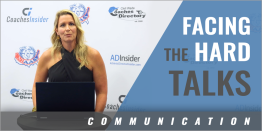|
By:Caroline Blaylock MA, CAA - Director of Athletics - Fountain Valley School of Colorado There is nothing worse than a hypocrite. For those of us in education who have worked their way up the ladder into administration positions, leading by example should be one of the first things we do as leaders. As a female athletic administrator, I find it even more important to carry the mantle of modeling healthy choices not only in my diet and daily exercise but in how I relate to student-athletes and coaches. Being an educator is about modeling the behavior we want to see our students and coaches emulate in the classroom and on the field. UCLA Hall of Fame basketball coach John Wooden considers "being a role model the most powerful form of educating." Athletic Directors want coaches and athletes to develop a love of learning, be passionate about coaching and playing, and to develop a lifelong appreciation of healthy choices. One of my first priorities as a Director of Athletics is to earn the respect of my coaches and athletes as a result of my own work ethic in the weight room, engagement with teams and by my experience in athletics. One way I intentionally work to earn my students' respect is by choosing workout times when I know some of them will be in the weight room, so they will see me performing the same exercises and drills we are asking them to do in early morning lifting sessions and in class. Not only are we suffering through the same workouts, but we are cultivating relationships in an arena that removes the barriers and formality of administrator and student. In the weight room, we are all working to push ourselves to be our best physically as one team offering encouragement and positive affirmations through the process. Cultivating a healthy relationship between coaches and athletes begins with being present and inclusive. Inclusive leadership is vital to the prolonged success of any athletic program and is rooted in commitment, collaboration, cultural intelligence as well as having an open mindset according to Medford Moorer, Associate Director of Academics and Development at University of Colorado at Boulder. Moorer believes leaders need to invest in people by building shared aspirations and gaining a clear understanding of a team's values and mission. This is especially true in the boarding school environment, where it is even more important to recognize and support the diversity component of your student body. At the Fountain Valley School of Colorado, we have students from 16 countries and 21 states living in 10 dormitories on campus. Not only are these students coming from various parts of the world, but they bring differences of religious beliefs, cultural celebrations and political views into a micro-culture that should support each of them by understanding how they view and experience the world. Another method I employ to be present with my student-athletes is to participate in practice. Being an active participant not only serves as an opportunity for student-athletes to see me as a team member but also to offer coaches feedback on how their practice plans and lessons are being received. As Athletic Directors, when we are able to support and empower these coaches and student-athletes to feel supported and valued, then we will see the result of our leadership. Student-athletes who in turn become leaders to younger athletes, learn to be productive members of a larger team and learning to act with integrity; these are the positive result of our guidance. What does leading by example really look like? Is leading by example quantifiable? The answer depends on the ideals that you are working to achieve. In its truest sense, leading by example involves acknowledging failure, assuming responsibility, taking care of yourself physically and emotionally, being a good listener and empowering others to succeed. Perhaps the most important of these qualities is the empowerment of others to lead. In Eyewitness to Power, David Gergen writes, "the heart of leadership is the leader's relationship with followers. People will entrust their hopes and dreams to another person only if they think the other is a reliable vessel." By empowering our students and coaches to step up as leaders, we are cultivating the foundation of positive, sustainable programs rooted in traditions of excellence. Equally important as empowering others is the necessity for today's student-athletes to learn the value of failing and the lessons that those failures provide. In her book, The Gift of Failure: How the Best Parents Let Go So Their Children Can Succeed, author Jessica Lahey illustrates how the fear of failure is resulting in a decline in learning and the success of student-athletes in the classroom and on the court. Lahey also goes on to outline the benefits of letting our student-athletes fail to develop the skills, resilience and mental fortitude necessary to overcome difficult situations. Failures and the lessons student-athletes learn from them become the DNA of resilience later in their professional lives. Duke University's Sim Sitkin, describes the process to manage, mitigate, and learn from failures as "Intelligent Failure" and goes on to highlight the value of these situations as opportunities for creativity and growth. It is equally important for our student-athletes to see us fail as coaches and administrators and to learn from our responses to adverse situations. These opportunities for growth become the valuable life lessons of integrity, adversity, and perseverance that are more meaningful than any victories or championships we may experience on the field or court. |







